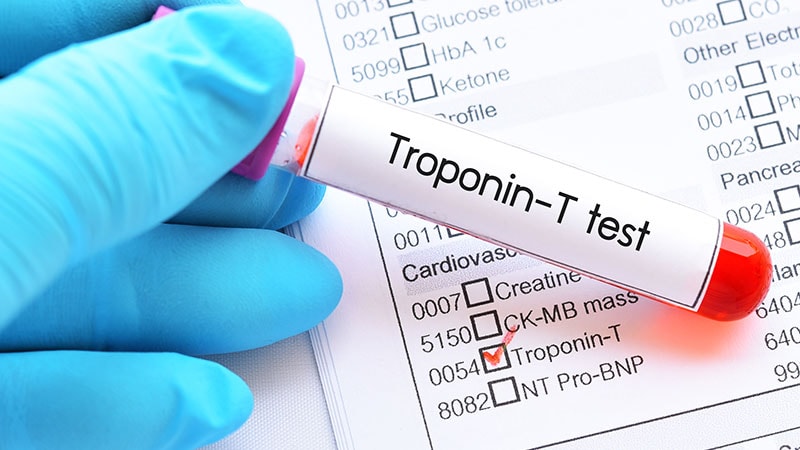Cardiac Troponin T Predicts 30-Day Mortality After Cardiac Surgery
核心概念
High-sensitivity cardiac troponin T levels predict 30-day mortality post cardiac surgery.
要約
TOPLINE:
- Perioperative myocardial injury, indicated by high-sensitivity cardiac troponin T release, links to 30-day mortality post cardiac surgeries.
METHODOLOGY:
- Retrospective study with 8292 patients showed high hs-cTnT levels associated with 30-day mortality.
- Troponin levels used to assess myocardial injury in CABG, AVR, and other cardiac surgeries.
TAKEAWAY:
- 30-day mortality rates varied among surgery types.
- High hs-cTnT levels increased the risk of death post-surgery.
- Predictive hs-cTnT levels for mortality were significantly higher than current definitions.
IN PRACTICE:
- Study suggests current definitions of peri-procedural myocardial injury are too conservative.
- Authors recommend updating diagnostic criteria with high-sensitivity cardiac troponin data.
SOURCE:
- Study led by Leo Pölzl, MD, published in the Journal of the American College of Cardiology.
LIMITATIONS:
- Retrospective, single-center study with potential confounding and bias.
- Thresholds for troponin values may have lower sensitivity.
- Results may not apply to all non-CABG, non-AVR surgery patients.
DISCLOSURES:
- Study authors report no relevant conflicts of interest.
- Devereaux has received grants from various organizations.
要約をカスタマイズ
AI でリライト
引用を生成
原文を翻訳
他の言語に翻訳
マインドマップを作成
原文コンテンツから
原文を表示
www.medscape.com
Cardiac Troponin Predicts Mortality Post Surgery
統計
"Death within 30 days occurred in 2.5% of the patients."
"The threshold hs-cTnT level for predicting 30-day mortality was 2385 ng/L for isolated CABG."
"The area under the curve of 0.586 for 5-year mortality."
引用
"These results provide important novel insights into the association of hs-cTnT with 30-day mortality."
"The current diagnostic criteria for perioperative myocardial infarction/injury need to be updated with these high-sensitivity cardiac troponin data."
抽出されたキーインサイト
by Pauline Ande... 場所 www.medscape.com 09-27-2023
https://www.medscape.com/viewarticle/996877
深掘り質問
How can the findings of this study impact current surgical practices?
The findings of this study can have a significant impact on current surgical practices by highlighting the importance of high-sensitivity cardiac troponin T (hs-cTnT) levels in predicting mortality post-surgery. The study suggests that the current definitions of peri-procedural myocardial injury may be too conservative in predicting mortality, as the cutoff values for hs-cTnT associated with 30-day mortality were found to be higher than previously proposed. This information can lead to a reevaluation of the diagnostic criteria for perioperative myocardial infarction/injury, potentially leading to more accurate risk assessment and better patient outcomes in cardiac surgeries.
What potential biases could have influenced the results of this study?
Several potential biases could have influenced the results of this study. Firstly, the retrospective and observational nature of the study introduces the possibility of confounding variables affecting the outcomes. Additionally, the statistical method used to determine cardiac troponin values may have resulted in thresholds with lower sensitivity, impacting the accuracy of the findings. Moreover, the study's focus on the highest hs-cTnT value measured during the first 72 hours after surgery could have skewed the results, as assessing troponin levels on each postoperative day individually might have provided a more nuanced understanding of the relationship between troponin release and mortality.
How might advancements in high-sensitivity cardiac troponin testing improve patient outcomes in other medical fields?
Advancements in high-sensitivity cardiac troponin testing have the potential to improve patient outcomes in various medical fields beyond cardiac surgery. By utilizing more sensitive troponin assays, healthcare providers can detect myocardial injury earlier and more accurately, allowing for timely interventions and better management of patients at risk of adverse cardiac events. This improved risk stratification can benefit patients undergoing non-cardiac surgeries, emergency department admissions, and even in outpatient settings where early detection of cardiac issues can lead to better outcomes. Additionally, the use of high-sensitivity troponin testing in other medical fields can help in the early diagnosis of conditions such as heart failure, pulmonary embolism, and sepsis, leading to more targeted and effective treatment strategies.
0
